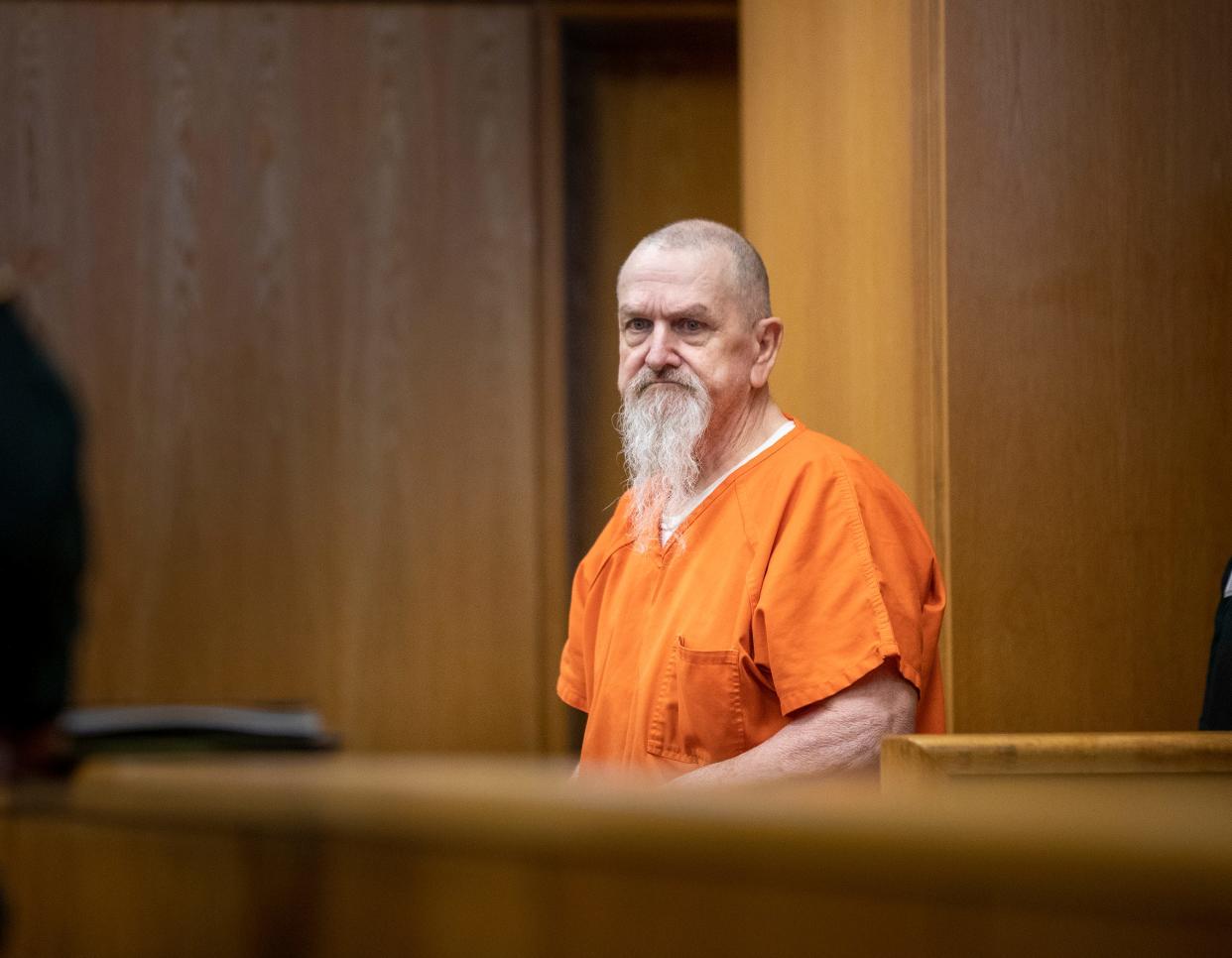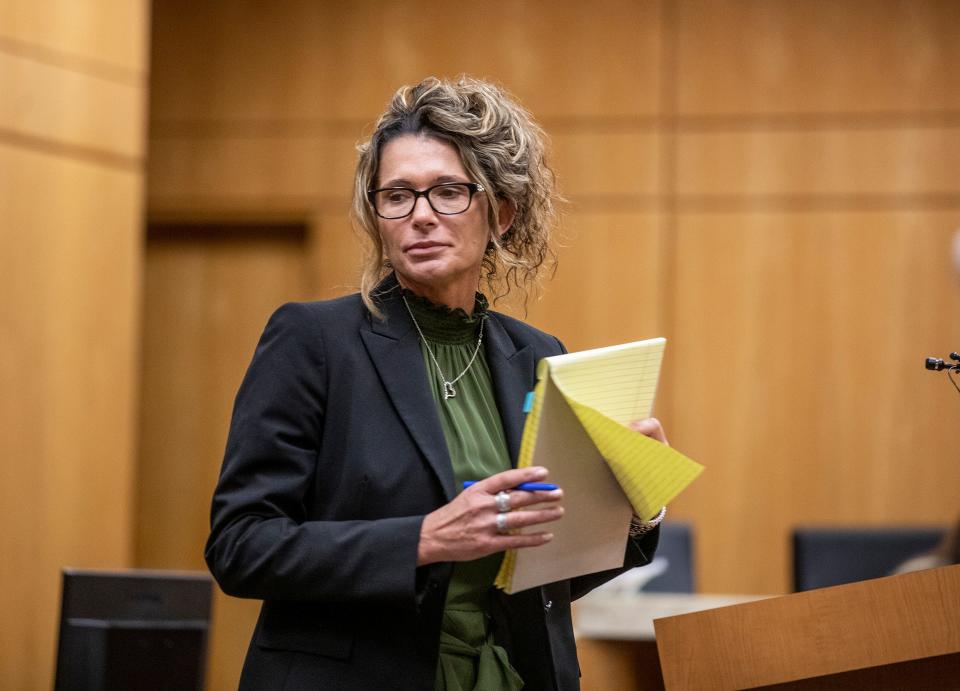David Murdock murder trial nears. Lawyer again challenges jail rules and death sentencing

Jury selection is set to begin Wednesday in a first-degree murder trial for a Lake Wales man accused of shooting of his ex-girlfriend in 2019 “to get rid of the devil,” court records show.
The prosecution has filed paperwork with the 10th Circuit Judicial Court seeking the death penalty if David Marshall Murdock is found guilty of the murder charge.
The 65-year-old, awaiting trial for five years, also faces charges of attempted first-degree murder, armed burglary of a dwelling and shooting into a building.
Polk County Jail records showed his disposition after incarceration, as “incompetent to proceed.” A grand jury later indicted Murdock on all four charges.
The woman Murdock is accused of killing on Jan. 5, 2019, was visiting friends in Florida during the holiday season, according to an account in a Polk County Sheriff’s Office charging affidavit. She had previously fled the state because of domestic violence.
According to the report, Murdock learned she was back in town, could not reach her the day before by cell phone and shortly after 1 a.m., he went to her friend’s house at 373 Melbourne Drive in the Sweetwater Golf and Tennis Community in Haines City.
The affidavit says he shot his ex-girlfriend, Lisa Lorraine Bunce, 56, who was found unresponsive in a bedroom closet within the home, and also shot her friend, Sandra Andrews, 66 at the time, who was found crawling on the front porch.
Both had gunshot wounds to the head, the Sheriff’s Office affidavit said. Bunce was pronounced dead at the scene by first responders less than 30 minutes after calls to 911 were received.
Andrews later told deputies at Lakeland Regional Health Medical Center that David Murdock was the shooter, the affidavit said. She recovered from her injuries.
Murdock had forced his way into the home while armed with a 9-mm Glock handgun, the affidavit said. Several spent 9-mm shell casings were found in front of and inside the residence.
When deputies arrived, Murdock was standing in front of the home with his hands in the air. A handgun was found in the driveway, and his gray 2013 Dodge pickup was parked in front of the residence.
Murdock had called 911 at 1:12 a.m. after the shootings and told a dispatcher his version of the incident, the Ledger previously reported.
"It's an emergency. I just shot two people at 373 Melbourne Drive," the report said.
The 911 call taker replied, "You just did?"
Murdock said, "Yes, I did. I had to get rid of the devil. I am sitting out by the light. I'm not leaving. I'm sorry I had to get rid of the devil."
Andrews had also called 911 to report she had been shot. And three neighbors had called 911 to report shots fired.
Investigators noted that Bunce and Murdock had dated until about October 2018 after allegations of violence surfaced. Bunce lived in Ohio after she left Florida and was visiting Andrews. Bunce was scheduled to return to Ohio.
Challenging jail policies again
Before jury selection begins Wednesday, Murdock’s defense has made several arguments in recent months that the Polk County jail policies and the death penalty scheme in Florida are unconstitutional.
The most recent hearing on those issues occurred before Circuit Judge J. Kevin Abdoney on Feb. 15.
In an ancillary motion related to the jail policies, Abdoney started with a request from Murdock to fire his defense attorney, Debra Tuomey, in paperwork he filed on Jan. 31.
Seeking to clarify the “pro se” motion by Murdock in his own case, Abdoney asked whether he intended to fire his entire defense team or just Tuomey. Murdock had been sworn in by Abdoney as a witness.

He then told the judge he had wanted Tuomey replaced with another defense attorney because of what she said during an earlier hearing Jan. 9 on the restrictive jail policies, including her statement that, “I cannot and will not be able to defend my clients” without better access to clients at the jail.
“That had me very concerned,” Murdock said. “And I totally agree with her 100% because the jail has done everything possible to keep me and Ms. Tuomey from having conversations and getting together.”
Visiting restrictions and access to documents for death penalty defendants to view in preparation for their cases have been a challenge for the defense, they said.
Murdock cited a recent incident at the jail in which he met to go over his case with Tuomey and the light flashed a signal that she had to leave after only 15 minutes.
“Every time we get into a conference, the jail interferes and tells us, ‘Times up, you got to go,'” Murdock said.
When pressed by Abdoney about whether he still wanted Tuomey as his attorney, Murdock continued with his complaints about the jail policy before ultimately, saying he wanted Tuomey to continue as his attorney.
“Well, I would like to know if she can possibly defend me,” he said. “I cannot come to trial after an attorney makes a statement there is no possible way she can defend me in court on a decision made.“
Then Murdock added, “I have not had adequate time to go over my case with Ms. Tuomey. To this date, I have not got my discovery.”
In motions filed last year in Murdock’s case but expanded to multiple death penalty cases in Polk Couty, Tuomey had said the jail policies prevented their defense team from “efficient” and “effective” representation of her clients.
And restricted communications with defendants violates their constitutional rights, the motion stated.
If the Sheriff’s Office would not change its jail policies nor the court issue such an order, then Tuomey had asked the judge to consider an order that her clients be transported to a location such as the courthouse for legal counsel.
But Abdoney denied both motions and repeated in his ruling that the judicial branch of government cannot tell an executive branch agency, such as the Sheriff’s Office, what to do.
Still, Abdoney asked the prosecutor, Assistant State Attorney Bonde Erik Johnson if he could ask the sheriff’s attorney to intervene so Murdock could view his case documents and be prepared for trial.
Inmates are given a tablet device to view their documents, but Murdock had told the court that he was not familiar enough with the device to even turn it on and wanted someone to show him how it works.
Detainees can also view their case documents and other media from a kiosk but that does not afford them the privacy that a tablet or paper copies. Also, client-attorney mail is typically scanned into a computer on a cart.
Access to documents: Defense attorney in 8 death penalty cases calls Polk jail policies unconstitutional
Abdoney also said, “I get that you have pointed out that some testimony at the hearing was the defendant actually scans the paper, and now we are learning that potentially it's the deputy that scans the paper.”
Tuomey also said the number of tablets available for inmates to use was not accurately represented to the court at the last hearing on the issue.
Florida's death-penalty sentencing
Murdock’s defense had also filed a motion asking Abdoney to revisit and rule in his favor on the potential unconstitutionality of Florida’s new threshold of 8-4 for juries to recommend a death sentence.
She cited the “ex post facto” clause in the U.S. Constitution, which bans legislatures from enacting laws that impose criminal liability or increase criminal punishment retroactively. She also cited Florida statute.
In July, Tuomey filed a motion asking Abdoney to require the higher threshold of a unanimous jury to recommend the death penalty that could have impacted her other Polk County death penalty cases.
Abdoney did rule in her favor then, in the case of Bryan Riley, charged with killing four members of a North Lakeland family members in the predawn hours of September 2021. In that order, Abdoney said the new 8-4 standard could not apply because the crime occurred before the law changed in Florida.
But in the lead up to the trial of Marcelle Jerrill Waldon, who killed former Lakeland City Commissioner Edie Yates Henderson and her husband, David Henderson in November 2020 trial, Abdoney made a different ruling. By that time, the 5th District Court of Appeals had ruled the 8-4 threshold stands. Waldon has not yet been sentenced, but a jury recommended death by an 11-1 vote on Feb. 6.
According to Abdoney, the appeals court said the 8-4 standard "was procedural and that it didn't affect the maximum penalty that could be imposed and determined that it was not an ex post facto violation.”
There are also two appeals to the 6th District Court of Appeals pending in the Riley and Angel Lobato cases, but a 6th DCA decision had not been posted to its website as of Friday.
On Thursday, a status hearing on the Murdock trial was held. All parties are expected to report for the jury selection phase of the trial at 8 a.m. Wednesday at the courthouse in Bartow.
This article originally appeared on The Ledger: As another Polk murder trial nears, defense lodges familiar challenges

